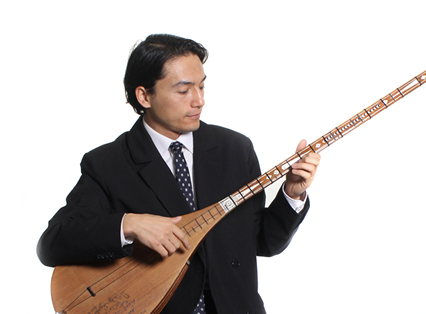Born in Kashgar, in the Uyghur region, Shohret Nur is a musician and ethnomusicologist devoted to preserving and evolving Uyghur musical heritage while amplifying the voices of his people through performance, research, and education. Currently based in London, Shohret works as a research assistant in the music department at SOAS, University of London, where he collaborates on projects exploring maqam-based music and supports the SOAS Silk Road and Middle East music ensembles.
Shohret’s connection to Uyghur music is deeply personal. His great-grandfather began playing the dutar in 1892, and his grandmother — a professional dancer and dutar player — became his first music teacher, instilling a love for music that shaped his entire life. After earning professional training in rawap performance at the Xinjiang Arts Institute, he moved to Turkey to study ethnomusicology at Mimar Sinan Fine Arts University, where he graduated as an honur student.
Driven by the need to safeguard Uyghur musical traditions, Shohret developed his own contemporary dutar technique, blending tradition with innovation to craft a unique musical style. He teaching dutar at SOAS and has led masterclasses at UCLA and UC Santa Cruz, sharing his knowledge with students worldwide.
Shohret has performed globally, from prestigious venues like the British Library to international festivals, and is a 2024 fellow of Making Tracks, a platform connecting musicians to environmental and social change movements. Through his work, Shohret aspires not only to celebrate Uyghur culture but to inspire hope and resilience within a community scattered across the globe. His ongoing research, performances, and artistic collaborations serve as both testimony and tribute to the endurance of Uyghur identity.
Residency project:
The multidisciplinary project Cauchemar /Qoshmaq was born out of the meeting between two Uyghur artists who are refugees in France, Erpan Hesher (electronic musician) and Merdan Eheteli (poet), and their collaboration with a collective of artists and researchers in the humanities. Since 2021, they have been working with the Uyghur Institute of Europe (an NGO based in Paris that secured recognition of the Uyghur genocide by the French Parliament in January 2022) on artistic productions and performances that portray the psychological reality experienced by members of the Uyghur diaspora in France and Europe.
The residency will enable us to continue and finalise the writing of this performance, complete the composition and musical form corresponding to our project, and integrate visual material (videos and drawings).

